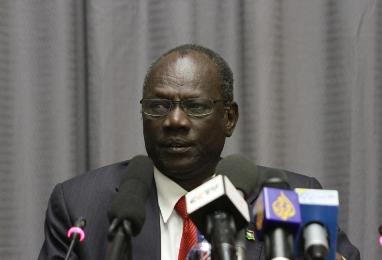S. Sudan gov’t downplays prominence of former detainees for reception
June 1, 2015 (JUBA) – South Sudanese government on Monday downplayed the prominence of some of the returning ex-political detainees on arrival after spending more than one year in exile, saying they were treated like ordinary citizens with no significance for reception.

“There were no preparations for them because they are returning as ordinary citizens. What the government has done is the provision of security and protection to them,” said minister Lueth.
He was explaining to the press the reason as to why the government did not organize a reception for the return of the exiled officials at the airport.
Lueth, who speaks for the government, said family members and relatives of the ex-detainees were however allowed to receive them in “whatever fits the day” provided that it did not undermine security and public order.
The group sometimes referred to as ‘G-10’ is a composition of middle and high ranking members of the governing Sudan People’s Liberation Movement (SPLM) who were accused and arrested for allegedly masterminding the unrest with the former vice-president, Riek Machar. The group was gradually released following the outpour of intense pressure from Machar’s armed opposition group and demand on the government from the inside the country as well as from region and the international community.
The G-10 was released to neighbouring Kenya on the request of the Kenyan president, Uhuru Kenyatta, and his administration to provide a safe haven for them until such time when political differences were settled.
Although group shared a lot in common with the armed opposition under the leadership of the former vice-president, Machar, they decided after the release to participate in the negotiating table as a third party in the conflict, separate from the government and the armed opposition leadership.
Speaking after arrival at Juba airport, Deng Alor Kuol, head of the team, said the return visit was very important because it would explore ways and means on how the conflict could be arrested using the capability of the SPLM and home-grown approach to removal of the obstacles to bring peace and end the suffering in the country.
“I am confidence and hopeful of the capability of SPLM leadership to come out of this situation. We will be meeting the president and some SPLM members to discuss how best this situation can be arrested so that peace returns and embark on reconciliation and healing process,” said Kuol.
He emphasized that the visit would play a strong role in confidence building among the leadership of the three SPLM factions to implement the reunification agreement reached in the Tanzanian town of Arusha early this year.
Foreign affairs and international cooperation minister, Barnaba Marial Benjamin, said the return of the former detainees demonstrated commitment of the government to fully implement the Arusha reunification accord and willingness to end the conflict through peaceful dialogue.
Marial was referring to the clause in the roadmap agreement in Arusha which called for reinstatement of the former party officials to their positions.
Deputy speaker of the council of state, Clement Janda, said the return of the former detainees was a one important step towards peace and confidence building.
“Their coming is a signal of hope and represents a desire to end the conflict through dialogue using home-grown approach to complement the current peace effort,” he said.
The legislator said implementation of the Arusha reunification agreement of the SPLM leadership will provide a solid foundation to resolving difficulties in IGAD led peace talks in Ethiopia.
(ST)
